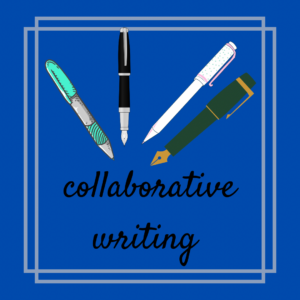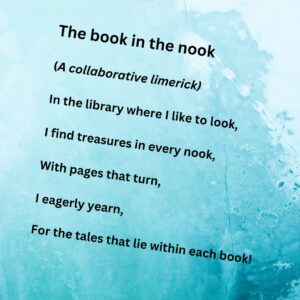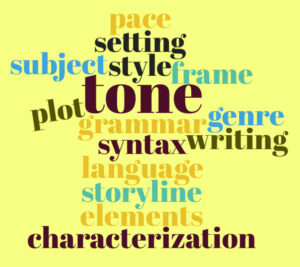 [This is part 3 of our Mystery of Collaborative Mysteries series, where we try to solve the mystery of several identical mystery book series published recently. his post includes a bit of the history of ghostwriting and lots of speculation on the use of generative AI in publishing, all a mystery! Read part 1 and part 2.]
[This is part 3 of our Mystery of Collaborative Mysteries series, where we try to solve the mystery of several identical mystery book series published recently. his post includes a bit of the history of ghostwriting and lots of speculation on the use of generative AI in publishing, all a mystery! Read part 1 and part 2.]
Artificial Intelligence as co-author
It doesn’t sound too crazy to consider whether Artificial Intelligence (AI) has been involved in “writing” so many books in such a short timeframe. Technology already provides both the resources and means. Generative AI applications like GPT-4 and Bard have the potential to scrape the Web for content without the authors’ permission (or compensation). Web scraping is the process of acquiring information from websites: crawling and indexing pages, harvesting data via http protocol to extract and separate (or in more techie language, parse) from the downloaded html files, which is also used for machine learning.
Cost-effective AI-powered web scraping can be fast, flexible, and uses efficient to extract content and data. Currently, this use is not prohibited by law. Built on Large Language Models (LLM), generative AI can also be prompt-engineered, or “trained” and enhanced with the capability to spit out seemingly new content in response to users’ prompts.
 What’s that got to do with the price of cheese? (Side note: The author in me wants to know how AI handles the challenges of slang, colloquialisms, and mixed metaphors. Spoiler alert, from my translation experience: still not too well.)
What’s that got to do with the price of cheese? (Side note: The author in me wants to know how AI handles the challenges of slang, colloquialisms, and mixed metaphors. Spoiler alert, from my translation experience: still not too well.)
First, there’s the issue of fair use of the harvested content, in this case, the collected works of published writers. Several authors already raised their voices against the questionable practice of copyrighted works ingested into the LLMs without their consent, credit, or compensation.
From the authors’ perspective: “The potential of mediocre, machine-written books, stories, and journalism based on authors’ original work flooding the market poses a significant threat to the writing profession.” More than 15,000 members of the Authors Guild signed an open letter to generative AI Industry Leaders (such as CEOs of OpenAI, Alphabet, Meta, Stability AI, IBM, and Microsoft) to Protect Writers to obtain consent, credit, and fair compensation for the use of copyrighted materials in training AI. Most recently, the New York Times sued OpenAI and Microsoft for copyright infringement, for using texts published in the Times to train their AI software.
 Then there is the quality issue. For example, AI can write poetry. See my limerick co-authored by Chat GPT about books. Is this any good? I’m not sure, but it’s not terrible. It fits the genre, makes sense, and stays in character. By the same token, I bet AI could probably generate tons of Hercule Poirot or Sherlock Holmes novels too, if the authors’ estates would allow that.
Then there is the quality issue. For example, AI can write poetry. See my limerick co-authored by Chat GPT about books. Is this any good? I’m not sure, but it’s not terrible. It fits the genre, makes sense, and stays in character. By the same token, I bet AI could probably generate tons of Hercule Poirot or Sherlock Holmes novels too, if the authors’ estates would allow that.
Mass production of collaborative mysteries
Going back to the mystery of collaborative mysteries from part 1, I believe no one will have the time (and the patience) to read all of those books. I must admit that they tend to become annoyingly repetitive after a while. Based on the ones I read, I truly miss the flesh-and-blood characters created by a flesh-and-blood author, ghostwriter or not, who is talented, experienced, and equipped to develop realistic protagonists along with diverse supporting characters.
I also miss the social and cultural context that would make the stories not only authentic but also compelling. It’s not just that one is looking for a “message” from the author or anything that points beyond the plot, but we do want a book, even one we’re reading for fun, to speak to us. Readers are looking for something that resonates with them, with their thoughts and concerns, wherever they are in their personal lives and careers. These texts sound too artificial to have that kind of effect.
 As if the so-called “appeal factor” from a Reader’s Advisory manual had been programmed into the “creative” process, factors such as setting, storyline, characterization, pace, tone, frame, and writing style, in addition to the genre, subject, and plot elements seem to be almost identical in all books of the series as well as within the series authored by different writers. Meanwhile I discovered how some AI writing apps can not only elaborate on a sentence and develop it into a paragraph, but incorporate other selected variables, such as tones, from a pulldown menu for a pretty penny.
As if the so-called “appeal factor” from a Reader’s Advisory manual had been programmed into the “creative” process, factors such as setting, storyline, characterization, pace, tone, frame, and writing style, in addition to the genre, subject, and plot elements seem to be almost identical in all books of the series as well as within the series authored by different writers. Meanwhile I discovered how some AI writing apps can not only elaborate on a sentence and develop it into a paragraph, but incorporate other selected variables, such as tones, from a pulldown menu for a pretty penny.
Despite the proper use of grammar, syntax, tone, and style, the language of these books also sounds too “sterile.” By that I mean that these books are uninspiring, they lack imagination and energy, the kind of enthusiasm that makes the reader “yearn for the tales that lie within each book,” if I may quote my co-authored limerick above.
Some native speaker readers even speculate that the books might have been written by non-native speakers of English, as the idiomatic use of the language is neither distinctly British, nor American English, or non-existent, making the text perfect for machine translation. Yes, I checked, and many of the books on my original list are available in other languages: Spanish, French, German, Italian, or even Russian.
Then there are those pesky little blunders that only locals would notice when events are placed in a specific region or town: the way we refer to certain locations, highways, or foods. Any New Jersey author will call the New Jersey Turnpike the Turnpike instead of I95, or even worse, the Californian “the” I95, just to mention an example (not necessarily from any particular book, of course).
The biggest telltale sign for me, someone who grew up in a small country, is the lack of the sense in these books of how big the United States is! Yes, one can hop on a plane to get from one big city to another, but it requires time, efforts, and preparations, and will come with all kinds of issues from time zones to fatigue, for the best trained and most heroic protagonists. Nuances obvious to a human easily fool the AI.
Most importantly, AI doesn’t seem to have adopted the concept of Equity, Diversity, Inclusion, and Social Justice (EDISJ), something that authors writing in the past few years aim for – and not necessarily just because they feel obliged to check the box or consider it the next new shiny thing. Working with editors of reputable publishers, it’s highly unlikely that EDISJ would have been overlooked in today’s publishing climate.
The plot thickens. Time will tell. Until then, there are several AI applications with the ability to write a whole novel.
I’m not sure how I feel about using one for my next book!